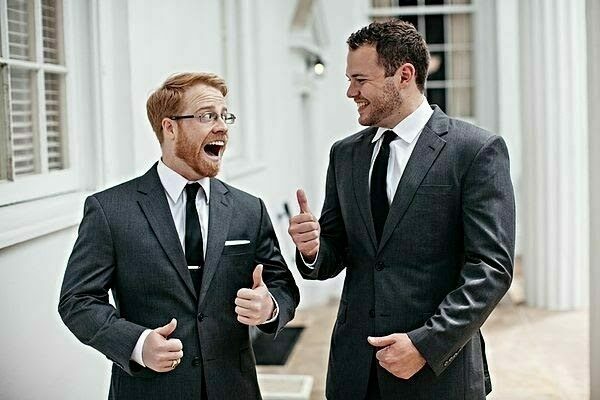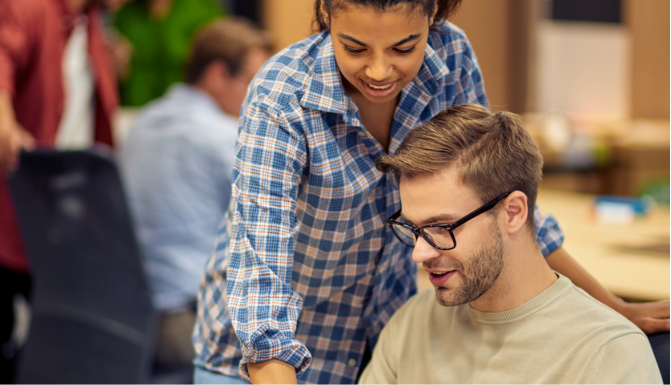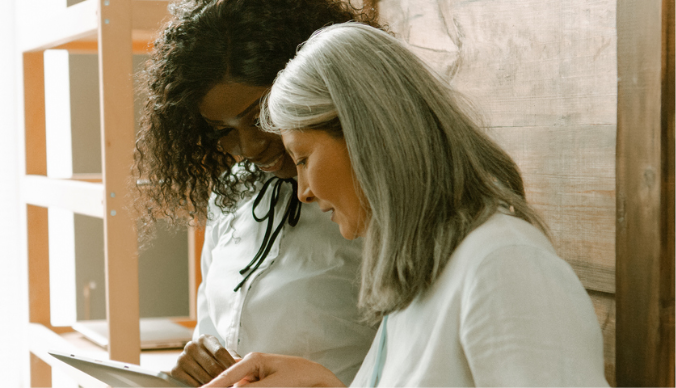The following is an interview with Dean Williams & George Ramsay, Davidson classes of ‘11 and ‘13 respectively. George majored in music while playing two years of soccer at Davidson. Dean was a psychology major and lifelong musician. Shortly after graduating, George and Dean co-founded a music lesson business – Bold Music.
Watch the recording of our interview.
Liz: Walk us through your entrepreneurial journey – take us back to Davidson, just give us a little bit of background up until the point you decided to found Bold Music.
Dean: George & I both were instructors before we were entrepreneurs. To this day, that remains one of our value adds as leaders in our business. We started ground up – we were doing it [teaching] and then we became entrepreneurs in this field.
I had the opportunity to run a music lesson program at a local music store, which gave me the experience of the operation side of the business, not just the teaching side. Since George & I had been buddies at school, I recruited him to come and play. In running that small program, we both realized that the teachers who were focused on being good teachers & role models had students who really stuck around.
We saw that component as well as a few other opportunities in the business to branch out on our own to really start something fresh that we could own and direct.
George: We looked at our experience teaching in a brick and mortar store and thought there’s a better way to do this – both from a teacher sanity perspective but also for students in families. George and I both thought why not eliminate the need for physical space and give busy parents the ability to have someone come to their house rather than commute for a music lesson.
Liz: Could you speak about how you define the two sided marketplace and break down your process for funding?
George: One of the problems we were solving when starting this company was providing substantial, beneficial, fulfilling work for teachers. The two sided marketplace means that we’re a service for music professionals by giving them a job, but also a service/marketplace for students. From the start, one of the important differences in our company is that the teacher is a little more important than the student. We felt that if we treated our teachers better, respectfully, and paid them more they’ll do a great job teaching and the student side of the marketplace will work itself out.
Dean: An easy way of thinking about that two sided marketplace is that you’re playing matchmaker. You’re not serving one side, you’re serving both sides and being really good at being a matchmaking is what differentiates Bold Music.
Liz: Not that you anticipated pandemic, but could you speak to how the virtual convenience factor is a benefit to you?
Dean: It’s funny you mention that…luck & preparedness are certainly important factors in running a business. George had proposed a video platform as an option for makeup lessons. One of the things we wrestled with was if people would find the experience of a similar value to an in person lessons. We wanted to make sure it was “dummy proof”. We had a portal built into our website, there’s a link to a student’s teacher’s portal – it was very easy for both sides for us. Then when the pandemic came, we were able to flip the switch and bring everyone over to this virtual platform that we’ve already built out.
George: The other piece of preparedness too was that this was a problem that we had been stewing over. As we went through 2019, we spent a good chunk of that time figuring out what we were going to do. By the time October came around, we settled on what language to use to tell people that they were going to get video lessons. It’s important to know that a video lesson is not the same as an in-person lesson; the challenge is to not make it any worse, just use what is beneficial about the virtual platform and don’t try to make it something that it isn’t.
Liz: How did Davidson prepare you & provide a foundation for your journey?
George: The crucial piece of the Davidson experience is that I didn’t become an expert in anything, but I got really good at learning how to learn. The curiosity that’s fostered at Davidson is the most beneficial thing [for me]. I was a soccer player for 2 years; the idea that I could be an athlete and a music major was really important to me.
Dean: The ability that you learn to quickly learn 2 inches deep on a variety of all subjects. If you take a creative writing class as a econ major, you’re gonna be able to do creative writing at a proficient level by the end of that class. Being an entrepreneur is exactly that: it’s learning a ton of different areas & learning a base-level proficiency.
Liz: Tell me a little bit about your co-founder relationship and how you’ve thought about building out your operation.
George: Like any co-founders, Dean and I have had our rough patches, but it’s a relationship built on trust. You have to be able to rely on each other blindly. It’s become more evident to me every day that we have two superstar employees that we hired. They’re helping us out and fired up about helping us grow our business, which is a testament to the communication skills we were able to pick up at Davidson.
Dean: We have a big team that works with us like part-time workers & consultants. George and I have taken a lot of time to find where we need help. [We] went out and found people to do other pieces of the business. We found people to do other things like marketing, public relationships, admin work, and we could spend our time on what we’re good at.
George: It’s also a direct result of networking. Dean found our digital marketer as a friend of a coworker of a friend, and he’s been with us for 5 years. It’s about always having your ear out for someone who can play a good positive role in what you’re doing and getting them to buy in.
Liz: Could you speak to the decision about how to scale your business, when to ask for crowding funding, and other decisions you’ve made?
Dean: For George & I, we were lucky that we were doing this in our early 20s when we started. The risk of failure wasn’t going to put our family out on the curb, but we were really careful about not risking our financial well being.
We wanted to start the business without debt. Our fixed costs were much lower than our variable cost, so we could invest in and grow the business as it grew. As we’ve grown, we haven’t taken much out of the business. Almost all of the profit from Bold had gone back into the business in order to grow.
George: The idea of funding to us…you don’t necessarily need funding. We, by necessity, just started a business that didn’t need funding. You can get creative with funding, we still haven’t figured out funding. We didn’t feel like we were ready to take on an investment of funding.
Liz: Can you walk us through the decision process to expand into Raleigh?
George: I don’t think we’ve hit critical mass here in Charlotte. There’s plenty of room to grow in Charlotte, but we’ve always wanted to expand and bring new geographical areas into the fold. We had to figure out how we wanted to grow & expand, and the Raleigh case is the first test case for figuring out what works and what doesn’t work.
Dean: Our business is really going to batch the wind in our sails when we’re in multiple markets because we can be centralized. We can do what we’re doing right now for 1 or 2 markets for a lot more. That’s really when Bold Music will hopefully find its greatest success. One of the things that’s important to use is to provide good music lessons for people. A lot of folks think about starting a business as having that next great idea, but ultimately what makes us successful is that we’re doing something people have done for a millennia but are making sure it’s done really really well.
Liz: What’s your advice for students and others looking to start a business & what’s your ask for how we can help?
Dean: Our ask & advice is pretty much the same thing: it’s to plug in with us. We would love your mentorship – we’re certainly far from knowing all there is to know. For the new students who are watching, we would love to hear your ideas and help and return the favor. I’ve had 4 real jobs since I graduated, and a Davidson allum has been my connection to every one. We want to help, whether that’s a coffee or an internship.
George: What separates an entrepreneur from a normal person is fear of failure. Trying something new is scary and you might fail, but do it anyway. Everyone’s got great ideas. Don’t let fear stop you from doing it.
Question from the audience: After being out in the world and working in music, what kinds of classes do you wish you would’ve had at Davidson?
George: The film music type classes were so helpful. I think if there could be more influence on score/production type classes, that would be really helpful. There’s a really nice connection to the commercial music world.
Dean: From a making-money perspective in music, a financial literacy class might be helpful. If you’re going to run a business, you have to know how to run a profits and loss sheet. Maybe there’s an entrepreneurship 101 class that could cover some of those things.
George: I took one econ class, but having really small applications like case-study examples. Classes where this stuff actually happens in the real world.
Question from the audience: Could you speak a little bit about how prominent mathematics is prominent in the music business?
George: Music is math, running a business is math. There’s a big need for automation from a programming perspective, and there’s so many cool ways you can use math with music.
Dean: You’ll certainly be over-qualified to do the math involved in running a business if you graduate with a math degree. As a math-minded person, you probably already have the skills to plug in. Your major doesn’t matter as much as your curiosity and dedication to it.
Question from audience: Going forward, what do you feel like you need more: teachers or students?
Dean: Teachers, we need teachers. One of things we’re very strict about is not just hiring a good guitar player, but hiring a good guitar player that’s a great teacher & role model. There’s not an obvious pipeline for us to hire from.
George: That’s the challenge, it’s been this never-ending problem of hiring good teachers. It’s actually our first-quarter number 1 priority, finding a new pipeline for finding good teachers.
Question form the audience: Any plans for franchising?
George: The short answer is no. The value we bring to the table is keeping everything centralized, so franchising doesn’t really make a whole lot of sense. We’re thinking more of planting in more geographical areas, but not relinquishing control or going in that direction.
Dean: The real advantage of franchising is that you have someone else doing it for you. Our advantage as a business is that we can scale pretty greatly off of a centralized model. We may need to hire an individual in a city to be a hiring filter, but other than that we can run more of the business from our office in Charlotte.
Question from the audience: How do you match teachers and students?
George: We hire for the person, we’ve brought on a flute teacher because she was awesome so we brought her on. We sort of are local to North Carolin], but with the virtual platform now we have teachers & students all over the place. We’re starting to think a little bit differently about that moving forward.
The matchmaking process is one of the fundamental operations of our business. We keep the matchmaking process analog, not automated. There’s a conversation with a student & the teacher, and it’s a very hands on process. The other big piece is routing, figuring out someone’s availability and finding when a teacher will be available near them.
Dean: There’s also a style element that you can’t automate. If there’s someone who has a 7 year old who wants to be like Taylor Swift, we’d pair them with Emily Sage who’s really great with little girls who want to sing and play guitar.
Sometimes it comes down to personality. We know the instructors really well, and try to get a feeling by asking really poignant questions with new students so we match folks whose styles work too.
George: We are what’s called a two-sided managed marketplace. With AirBnb, you don’t need to speak to anybody. We’re much more hands on, and that’s by design. Maybe at some point we’ll be like that, but for now, it’s important that we’re not only vetting the teacher but also the family.
Liz: Any final words?
George: Keep in touch! I love meeting people, shoot me an email at george@boldmusiclessons.com. We do a lot of posting @boldmusic on Instagram. I’ve always been a team-type person, and collaboration is something we’re super fired up about. If you have ideas, just shoot us an email. You never know what’ll come from a conversation.
Dean: We hope each of you follows up with us and has another question or wants to have coffee. We’d consider that a success for sure. The Davidson community has done so much for us, so we want to be sure to give back.



